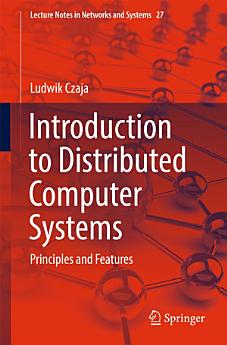Introduction to Distributed Computer Systems: Principles and Features
জানু ২০১৮ · Springer
ই-বুক
259
পৃষ্ঠা
reportরেটিং ও রিভিউ যাচাই করা হয়নি আরও জানুন
এই ই-বুকের বিষয়ে
This book introduces readers to selected issues in distributed systems, and primarily focuses on principles, not on technical details. Though the systems discussed are based on existing (von Neumann) computer architectures, the book also touches on emerging processing paradigms. Uniquely, it approaches system components not only as static constructs, but also “in action,” exploring the different states they pass through. The author’s teaching experience shows that newcomers to the field, students and even IT professionals can far more readily grasp the essence of distributed algorithmic structures in action, than on the basis of static descriptions.
লেখক সম্পর্কে
The author obtained the MSc, PhD and habilitation degrees from the University of Warsaw, where he was a professor of informatics at the Faculty of Mathematics, Informatics and Mechanics. He spent some years in other universities, like Carnegie-Mellon, Oxford, Ben-Gurion, Humboldt, as visiting professor or a research fellow. Now he is a professor of the Vistula University and professor emeritus of the University of Warsaw. His work encompasses formal and programming languages, compilers, theory of computation, parallel and distributed processing.
ই-বুকে রেটিং দিন
আপনার মতামত জানান।
পঠন তথ্য
স্মার্টফোন এবং ট্যাবলেট
Android এবং iPad/iPhone এর জন্য Google Play বই অ্যাপ ইনস্টল করুন। এটি আপনার অ্যাকাউন্টের সাথে অটোমেটিক সিঙ্ক হয় ও আপনি অনলাইন বা অফলাইন যাই থাকুন না কেন আপনাকে পড়তে দেয়।
ল্যাপটপ ও কম্পিউটার
Google Play থেকে কেনা অডিওবুক আপনি কম্পিউটারের ওয়েব ব্রাউজারে শুনতে পারেন।
eReader এবং অন্যান্য ডিভাইস
Kobo eReaders-এর মতো e-ink ডিভাইসে পড়তে, আপনাকে একটি ফাইল ডাউনলোড ও আপনার ডিভাইসে ট্রান্সফার করতে হবে। ব্যবহারকারীর উদ্দেশ্যে তৈরি সহায়তা কেন্দ্রতে দেওয়া নির্দেশাবলী অনুসরণ করে যেসব eReader-এ ফাইল পড়া যাবে সেখানে ট্রান্সফার করুন।






